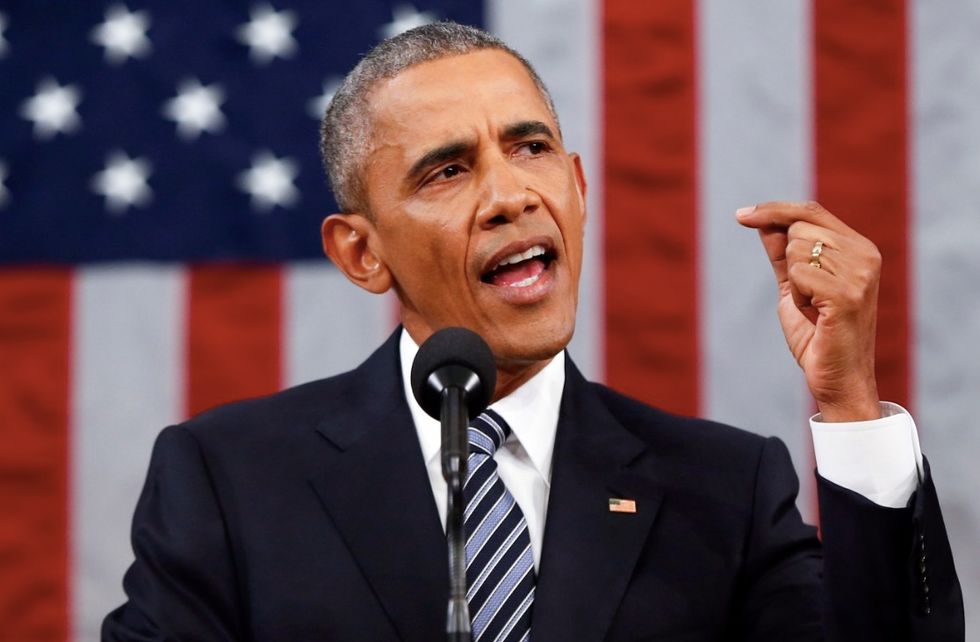
President Barack Obama delivers his State of the Union address before a joint session of Congress on Capitol Hill in Washington, Tuesday, Jan. 12, 2016. (AP Photo/Evan Vucci, Pool)

VIENNA (AP) — The U.N. nuclear agency certified Saturday that Iran has met all of its commitments under last summer's landmark nuclear deal, crowning years of U.S.-led efforts to crimp Iran's ability to make atomic weapons. For Iran, the move lifts Western economic sanctions that have been in place for years, unlocking access to $100 billion in frozen assets and unleashing new opportunities for its battered economy.
"The multinational economic and financial sanctions related to Iran's nuclear program are lifted," Federica Mogherini, the European Union's foreign policy chief, said in a joint statement also read in Farsi by Iranian Foreign Minister Mohammad Jawad Zarif.
President Barack Obama signed executive orders lifting economic sanctions on Iran and Mogherini said the EU had lifted its nuclear-related sanctions as well.
"This historic deal is both strong and fair, and it meets the requirements of all," Mogherini declared, saying it serves to "improve regional and international peace, security and stability."
U.S. Secretary of State John Kerry, who led the last years of negotiations with Zarif that culminated in the July 14 deal, confirmed that the U.N.'s International Atomic Energy could verify that "Iran has fully implemented its required commitments."
"Relations between Iran and the IAEA now enter a new phase," said IAEA director general Yukiya Amano. "It is an important day for the international community."
Progress also came Saturday on another area of Iran-U.S. tensions: U.S. and Iranian officials announced that Iran was releasing four detained Iranian-Americans in exchange for seven Iranians held or charged in the United States.
U.S. officials said the four — Washington Post reporter Jason Rezaian, former U.S. Marine Amir Hekmati, pastor Saeed Abedini and Nosratollah Khosravi-Roodsari — were to be flown from Iran to Switzerland on a Swiss plane and then brought to a U.S. military hospital in Landstuhl, Germany, for medical treatment.
In return, the U.S. will either pardon or drop charges against seven Iranians — six of them dual citizens — accused or convicted of violating U.S. sanctions. The U.S. will also drop Interpol "red notices" — essentially arrest warrants — on a handful of Iranian fugitives it has sought.
Rezaian is a dual Iran-U.S. citizen convicted of espionage by Iran in a closed-door trial in 2015. The Post and the U.S. government have denied the accusations, as has Rezaian.
The publisher of The Washington Post says he "couldn't be happier" to hear that Rezaian had been released from Iran's Evin Prison on Saturday. Publisher Frederick J. Ryan Jr. said more information would be available once he can confirm Rezaian has safely left Iran. Rezaian had been held more than 543 days on espionage and related charges.
U.S. officials say a fifth American detained in Iran, a student, has been released in a move unrelated to a prisoner swap earlier between the two countries. They said the student, identified as Matthew Trevithick, was released independently of the exchange and already was on his way home.
The landmark Iran nuclear agreement, struck after decades of hostility, defused the likelihood of U.S. or Israeli military action against Iran, something Zarif alluded to.
"Our region has been freed from shadow of an unnecessary conflict that could have caused concerns for the region," he said. "Today is also a good day for the world. Today will prove that we can solve important problems through diplomacy."
Iran insists all of its nuclear activities are peaceful. But under the July 14 deal, it agreed to crimp programs which could be used to make nuclear weapons in return for an end to sanctions. The agreement puts Iran's various nuclear activities under IAEA watch for up to 15 years, with an option to re-impose sanctions should Tehran break its commitments.
Associated Press Writer Ali Akbar Dareini contributed from Tehran.
This story has been updated.